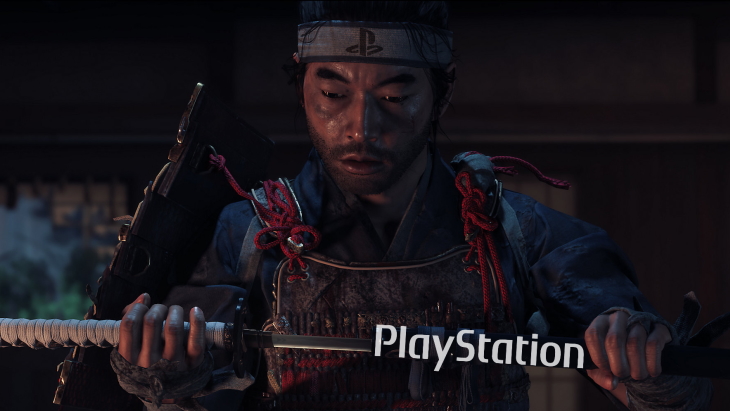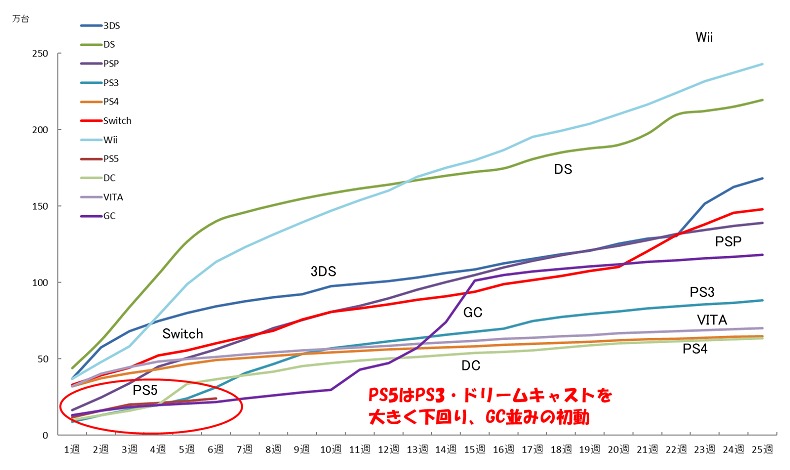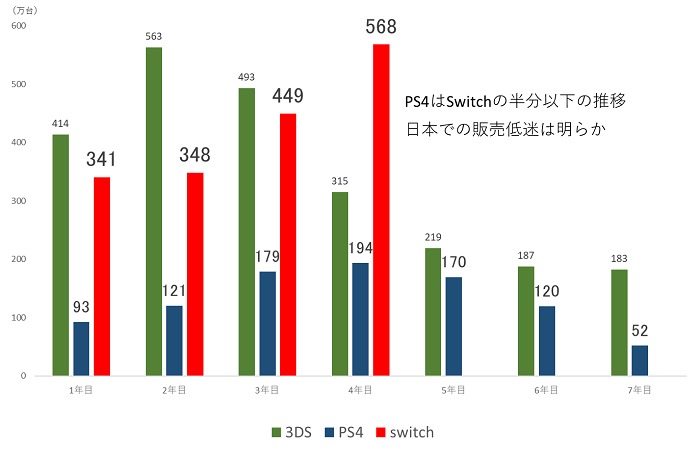
A market researcher has stated that it is “definitive” PlayStation will fall in Japan, due to censorship and not realizing the region’s potential.
The Japanese branch of GamesIndustry.biz (Translation: DeepL, adjusted) reports in their article “[Monthly Review] Examining Sony’s ‘We care about the Japanese market’.” The writer is analyst Hideki Yasuda of the Ace Research Institute, and states that the prior article showed “that there are a certain number of Japanese gamers who are quietly angry with Sony (SIE).”
The prior article entitled “PS5’s initial response is about the same as WonderSwan. Sony has given up on the Japanese market” discusses the next gen console’s initial sales. We previously reported how in the first week of sales estimates in Japan, the PlayStation 5 sold over 118,000 units; while Microsoft’s Xbox Series X|S sold over 21,500 units.
That article caused a response from Sony headquarters, stating they value the Japanese market. Similar occurred after a Bloomberg report claimed that PlayStation employees and developers were losing faith in Japan as a market.
Anonymous sources claimed SIE were frustrated the Japanese marketing team failing to sell more PlayStation 4 units. This resulted in the Japanese office being (in Bloomberg’s words) “sidelined” when it came to planning the promotion of the PlayStation 5.
A Sony spokesperson denied the reports and stated the “home market remains of utmost importance.” SIE CEO Jim Ryan also dismissed the claims as “inaccurate” and the region “remains incredibly important to us.”
The more recent Yasuda article claims “for the past few years, Sony (SIE) has been clearly focused on the U.S. market, and I believe that the hearts and minds of Japanese users have been steadily shifting away from PlayStation.” He also dismisses Sony’s statement. “I’m sure they really do care about it. However, the feelings are important, but the actions are not.”
Five major points that Yasuda claims indicate this include the 2013 launch of the PlayStation 4 being a late start in Japan, and the “restrictions on expression and suppressed the release of titles for Japanese users.” The latter undoubtedly refers to the censorship of anime-style sexual content “to meet global standards.” This censorship was seemingly forced in Japan.
Another major point against SIE are the PlayStation 5’s introduction video lacked Japanese narration, and had flaws in its fonts and translation. In a prior report we noted that two major PlayStation 5 livestreams premiered at 5 a.m. JST.
Yasuda also points out how the PlayStation 5 forced the global “X to confirm, O to cancel” button configuration on Japan (who had it reversed for the previous four consoles). As expected, Japanese fans were not happy. The fifth and final major point is how the PlayStation 5’s initial sales in Japan were only slightly higher than the PlayStation 3, had malfunctioning issues, and failed to reach early adopters.
Yasuda admits that while the almost worldwide launch of the PlayStation 5 is proof against his case (November 12th in Japan, the US, and other regions, November 19th worldwide), he claims it was in response to Microsoft’s efforts to capture the Japanese market. Even so, he still feels Japan is being treated as a “Tier 2” region, or second place.
The article continues, with Yasuda stating his belief that censorship was the biggest issue. He points out the hypocrisy of SIE’s censorship, while also owning Aniplex and making money from Fate/Grand Order’s gacha mechanics to earn characters in swimsuits. Yet, swimsuits are “prohibited from sale” on PlayStation 4, or forced to be modified.
“Doing this will only increase the distrust of the users. This should be stopped immediately. Unfortunately, however, it seems to be a taboo subject in Sony’s upper management, so I expect that the Ace Research Institute’s opinion will be completely ignored. I’m sure Sony will regret this.”
Yasuda then shares the PlayStation 5’s sales in Japan for its first six weeks after launch in comparison to the first 25 weeks of recent consoles (via Famitsu). You can find that graph below.

As aforementioned, the PlayStation 5 is currently below the PlayStation 5 within the same period of time. Yasuda notes this is 11,000 units in the fourth and fifth weeks, and 17,000 weeks in the sixth.
With an estimated total of 240,000 units (the lowest opening for a Sony console ever) he feels is too low, especially when combined with the low penetration in the Japanese market. “From this graph, can you sense Sony’s (SIE’s) intention to succeed in the Japanese market? For Ace Research Institute, it’s hard to see.”
It should be noted the coronavirus COVID-19 pandemic has caused purse-strings to be tightened, and numerous production issues globally. The PlayStation 5 also reportedly had issues with stock and production [1, 2, 3, 4], and all but the default model of the PlayStation 4 have been discontinued in Japan with remaining production shifted to the PlayStation 5.
Yasuda predicts the PlayStation 5 will sell less than half the units the PlayStation 4 did over its entire lifecycle. In early October 2020, Ryan stated the aim to sell more PlayStation 5 units over a fiscal year compared to the PlayStation 4- a figure of over seven million units.
Digitimes report that the console sold 3.4 million units globally in its first four weeks. If the estimations are accurate, that means the PlayStation 5 needs to sell 3.6 million units globally over the next 10 months or so.
Returning to Yasuda’s article, he states that SIE have “become so indifferent to domestic user trends is that they have lost sight of the principles of Japanese behavior after moving their headquarters to the US.” Gamers often blame the change in SIE’s business strategy- particularly the censorship- on the headquarters moving to San Mateo, California.
Yasuda theorizes that the move has resulted in SIE focusing on the US, a group who will always support them, over Japanese gamers who will not openly complain.
“As I mentioned in the previous article, Japanese game users don’t often express their dissatisfaction on social networking sites, so from the perspective of the staff at SIE headquarters in the U.S., Japanese users seem to be good customers who will accept them no matter how cold they are. In reality, however, this is not the case, and they are slowly and quietly disappearing.”
Considering all the above factors, Yasuda claims SIE “seems to have decided that the high-end gaming experience is unnecessary in the moe-dominated Japanese market, and that the platformer [platform] has lost the will to fulfill its responsibilities in the Japanese market.”
Combined with the initial response in Japan, Yasuda states “the fall of the PlayStation brand in the Japanese market has become definitive, and we at Ace Research Institute cannot help but feel deeply disappointed. Again, we are sure that Sony will regret this.”
Yasuda admits the caveat that the US makes up half the world’s video game market, and Japan’s economy has “been stagnant for the past 30 years.” As such, Japan’s market share could be as little as 10%. However, this betrays how high sales in Japan can reach.
Citing Famitsu again, Yasuda explains how the Nintendo Switch and 3DS sales have dwarfed the PlayStation 4 in Japan; both selling over 5 million units in recent years. The fourth year has seen the Nintendo Switch surpass the 3DS’ sales in that same period, with no clue of when it will peak out.

Total Nintendo Switch sales have exceeded 17 million units in Japan, and are expected to exceed 25 million units. As of November 2020, the Nintendo Switch has sold over 68 million units globally. Ace Research and Yasuda predicts total lifecycle sales to exceed 150 million units.
Comparatively, the PlayStation 4 sold 9.5 million in total in Japan, lower than the PlayStation 3. It also never sold more than 2 million units per year. Unsurprisingly, Yasuda predicts the PlayStation 4 will sell less than half as many units as the Nintendo Switch.
Finally, Yasuda discusses how Japan can be seen as a weak market when sales that high can be achived.
“Does it look like Japan is a market where game consoles are not selling well? It’s a market that can sell more than 20 million units with a little ingenuity. Dismissing the market because photo-realistic games are not mainstream or because dedicated consoles are not selling well seems to be a big problem from a business perspective, but I don’t feel a strong will from Sony (SIE). Also, the reaction of the capital market seems to be that all they need is the news that the PS5 is selling well, and they don’t seem to have any problem with the decline of the Japanese market.
In the past, the late Mr. Iwata of Nintendo also avoided declaring the failure of the system, saying that it would have a negative impact, but at Ace Research Institute, we believe that acknowledging the failure of the system will ultimately lead to the success of the next generation. Sony (SIE) will probably ignore these points this time, too. However, seeing Sony’s (SIE’s) inability to ship PS5 at the end of the year, I can’t help but be deeply concerned about the future of the PlayStation market in Japan.”
Image: Ghost of Tsushima official website, Wikipedia